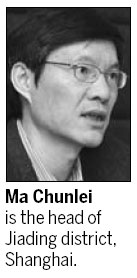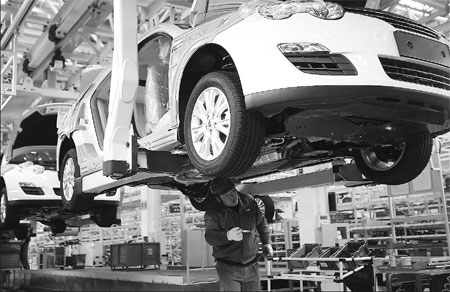'Detroit of the East' powers along
Updated: 2012-03-13 08:16
By Qu Yingpu and Xu Xiaomin in Shanghai (China Daily)
|
||||||||

|
Factory workers assemble Roewe 550s sedans on the production line at the auto plant of Shanghai Automotive Industry Corp (Group) in Jiading, Shanghai. Provide to China Daily |

Jiading, home of Shanghai Automotive Industry Corp (Group), maker of China's first "Shanghai" sedan, which used to rule the roads, has always been proud of its heritage as a key auto town in the Yangtze River Delta region.
Jiading, an 800-year-old district northwest of the city center, now aims to transform itself into an auto hub with a complete industrial chain.
"The district aims to cover every major part of the auto industry, instead of being a car manufacturing base like other cities," said Ma Chunlei, head of Jiading district.
"We aim to cover everything from the manufacturing of cars and components, to research and development, design, sales, and the training of the next generation of executives, engineers and designers," said Ma.
In doing this, he added, "We will also place great emphasis on the development of culture and sports in our district."
SAIC has moved on to bigger things, manufacturing a highly popular range of cars in a joint venture with Volkswagen of Germany, in addition to its own branded automobiles. It has also entered into a car production joint venture with US giant General Motors.
The company acquired several British marques and shifted production to its factories in Jiading. Sales of these cars, including Roewe and MG, are said to be brisk. In addition, SAIC has offshoots in Nanjing and other locations, producing commercial vehicles, earth-moving machines and auto parts.
Building on this solid foundation, authorities in this "Detroit of the East" want to realize their ambition of diversifying the district's industrial base.
Ma, who has been head of the district for less than six months, has a clear picture of Jiading's future. He said that in terms of the industrial chain and the value-added chain, Jiading enjoys a distinct advantage over other Chinese auto manufacturing bases, including Changchun in Jilin province and Shiyan in Hubei.
Since Shanghai marked the economic transition and industrial upgrade as a key task in the 12th Five-Year Plan (2011-15) period, many districts have focused on developing their service sector, particularly finance. Jiading is the exception, according to Ma, 46, a straight talker with a doctorate in law.
"I have different thoughts about economic transition," he said. He thinks each district should be allowed to develop its specific advantage, instead of marching in the same direction and at the same pace.
"It is counterproductive for all districts to devote themselves to building up the financial business or making bids to play host to headquarters of multinational companies," Ma said.
In 2011, the output of the auto and components industry amounted to 106.5 billion yuan ($16.8 billion), which accounted for 41.4 percent of the district's total output of major industrial entaerprises.
After analyzing Jiading's comparative advantage, the district's authorities decided that further development of the auto industry with high technological content should be "unwaveringly implemented" in the long term.
Ma and his colleagues in the district government are convinced that Jiading's advantage lies firmly in its tradition of engineering expertise.
The Shanghai government positioned Jiading as a technology satellite town as early as 1958. Now the district is home to 11 State-level scientific research institutes and nine university campuses, with a contingent of more than 20,000 professionals in various technology fields.
About 11 years ago, Jiading was named Shanghai International Auto City.
Other than building cars, Jiading has made a name for itself in the automotive world by hosting the annual F1 Grand Prix and establishing a car museum to tell the story of the development of the automotive industry to the rapidly growing ranks of car lovers around the country.
Despite its many achievements, Jiading has faced several challenges in developing an auto hub.
On the domestic front, the explosive growth of the number of cars has clogged the roads and fouled the air of many cities. Public outcry at the damage to the environment is putting pressure on the government to exercise greater control on the car population with tighter traffic regulations.
To face the challenge, Ma said there is a pressing need to build cleaner cars with a much higher technological input than before. He and some of his colleagues in the district government are planning to go to Japan, South Korea and Italy this year to woo potential partners.
"I think auto enterprises around the world will feel a great pressure of slowing demand in coming years," Ma said. "What we can do is to prepare ourselves so that we are in a position to minimize the impact."
To Ma, the biggest problem of economic transition is how to keep the district's economy moving steadily forward without falling over. It's like "riding a bicycle", he said. "The key to riding a bicycle well is to stay on course, maintain a steady speed and keep its balance," he said. If the rider can do that he can move forwards. "It is the same with the economic transition."
For Jiading, the direction is clear - build better cars with high technology content, Ma reiterated. Keeping a steady pace is also necessary, he said. "We seek to apply a suitable speed to push forward the industrial transition," Ma said.
He conceded that the country's fast pace of growth in the past has left behind problems that need to be addressed now before the economy can pick up new momentum again. Despite rapid economic progress, "we need to pay sufficiently close attention to people's livelihoods," Ma said.
Keeping a balance between economic growth and residents' quality of life and environment is always on his mind.
That's why Ma's blueprint for developing the auto industry excludes a key component: tires. This was not an oversight. "We deliberately kicked tire manufacturing off the to-do list because we need a more ecological environment for working and living," Ma said.
In the construction of Jiading's new city area in the south of the district, great emphasis is placed on creating an ecologically friendly environment. Green open space will take up 40 percent of the area and man-made lakes will occupy another 12 percent.
"The district's other ambition is to make Jiading a model of cosmopolitan life," Ma said, with confidence.
Contact the writers at quyingpu@chinadaily.com.cn and xuxiaomin@chinadaily.com.cn
(China Daily 03/13/2012 page4)

 Relief reaches isolated village
Relief reaches isolated village
 Rainfall poses new threats to quake-hit region
Rainfall poses new threats to quake-hit region
 Funerals begin for Boston bombing victims
Funerals begin for Boston bombing victims
 Quake takeaway from China's Air Force
Quake takeaway from China's Air Force
 Obama celebrates young inventors at science fair
Obama celebrates young inventors at science fair
 Earth Day marked around the world
Earth Day marked around the world
 Volunteer team helping students find sense of normalcy
Volunteer team helping students find sense of normalcy
 Ethnic groups quick to join rescue efforts
Ethnic groups quick to join rescue efforts
Most Viewed
Editor's Picks

|

|

|

|

|

|
Today's Top News
Health new priority for quake zone
Xi meets US top military officer
Japan's boats driven out of Diaoyu
China mulls online shopping legislation
Bird flu death toll rises to 22
Putin appoints new ambassador to China
Japanese ships blocked from Diaoyu Islands
Inspired by Guan, more Chinese pick up golf
US Weekly

|

|







